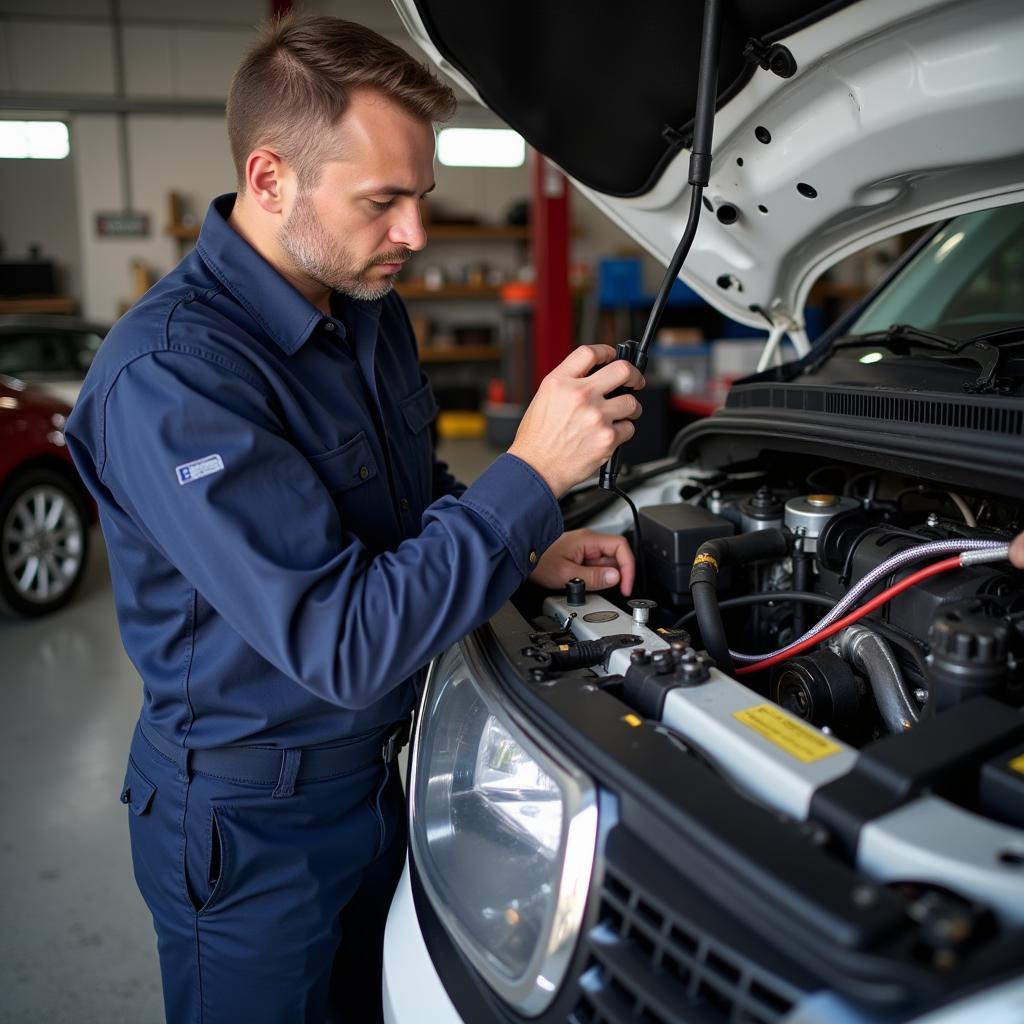Your car’s air conditioning system is a vital part of your comfort and safety, especially during hot weather. A leaking AC system can lead to reduced cooling performance, increased fuel consumption, and even damage to your car’s interior. If you suspect your car’s air conditioner is leaking, it’s important to address the issue as soon as possible. This comprehensive guide will walk you through the steps of identifying, diagnosing, and fixing an aircon leak, empowering you to get your AC back in top shape.
Understanding Car Aircon Leaks: The Basics
A car’s air conditioning system uses a refrigerant, a chemical that absorbs and releases heat, to cool the air inside your vehicle. This refrigerant circulates through a sealed system of components, including the compressor, condenser, evaporator, and expansion valve. An aircon leak occurs when the refrigerant escapes from this sealed system, usually through cracks, holes, or worn-out seals.
Signs of a Car Aircon Leak
Several common signs can indicate a leak in your car’s aircon system. Pay close attention to these warning signs:
- Weak or no cold air: The most noticeable sign of an aircon leak is a significant decrease in cooling performance.
- Unusual noises: A hissing or bubbling sound from under the hood, particularly when the air conditioner is turned on, might indicate a leak.
- Refrigerant smell: If you smell a sweet, chemical-like odor near your car, especially after running the air conditioner, it could be a sign of leaking refrigerant.
- Frozen aircon vents: If your aircon vents are blowing cold air, but the air feels frozen, it could be a sign of a leak.
- Low refrigerant levels: During a routine inspection, a technician may notice low refrigerant levels, indicating a possible leak.
Diagnosing an Aircon Leak: Finding the Source
The next step after identifying a possible leak is to pinpoint the source of the problem. There are several methods to diagnose an aircon leak:
1. Visual Inspection:
- Start with a visual inspection of the aircon system components. Look for any signs of damage, cracks, or corrosion.
- Pay attention to the hoses and pipes as they are common points for leaks.
- Check the connections between the components for any loose or missing clamps.
- Use a UV dye: In some cases, a technician may add a UV dye to the refrigerant to help pinpoint the leak.
 Car Aircon Leak Inspection
Car Aircon Leak Inspection
2. Pressure Testing:
- A pressure test involves pressurizing the aircon system with nitrogen or air.
- A leak detection tool is used to monitor the pressure and identify any drops that indicate a leak.
- Pressure testing is an effective method for locating pinhole leaks that may be difficult to see.
3. Electronic Leak Detection:
- Electronic leak detectors are sensitive instruments that can identify small leaks by detecting changes in the air composition.
- These devices can be used to pinpoint leaks in areas that are difficult to access visually.
 Electronic Aircon Leak Detector
Electronic Aircon Leak Detector
Fixing a Car Aircon Leak: Solutions and Considerations
Once the leak is identified, it’s time to repair the system. The repair process depends on the nature and severity of the leak.
Common Repair Methods:
- Sealing: Small leaks can sometimes be repaired by sealing the hole using epoxy, rubber sealant, or other materials.
- Replacing components: If the leak is extensive or in a critical component, replacement may be necessary. This could include replacing hoses, pipes, seals, or even the entire aircon unit.
- Recharging: After repairing the leak, the aircon system must be recharged with the correct amount of refrigerant.
Considerations for Repairs:
- Safety: Aircon systems use refrigerant that is flammable and can be harmful to the environment. Only qualified technicians should handle aircon repairs.
- Cost: The cost of repairing an aircon leak can vary depending on the severity of the leak, the components that need replacement, and the labor costs.
- Environmental Impact: Refrigerant is a greenhouse gas, so it’s essential to avoid unnecessary releases into the atmosphere. Technicians should use proper procedures to recover and recycle refrigerant during repairs.
Tips for Preventing Aircon Leaks: Maintenance and Care
Prevention is key to avoiding costly aircon repairs. Here are some tips for maintaining your car’s aircon system:
- Regular Inspections: Have your aircon system inspected by a qualified technician at least once a year.
- Check Fluid Levels: Make sure the refrigerant levels are adequate.
- Keep Your System Clean: Dust and debris can clog the aircon system and contribute to leaks.
- Don’t Overload the System: Avoid running your aircon on high settings for long periods, especially in hot weather.
- Avoid Harsh Chemicals: Avoid using harsh chemicals near the aircon system, as these can damage the components.
FAQ: Addressing Common Questions About Car Aircon Leaks
Here are some frequently asked questions about car aircon leaks:
1. How do I know if my aircon leak is small or large?
The size of the leak can be determined through pressure testing. A small leak may result in a slow drop in pressure, while a larger leak will cause a rapid pressure drop.
2. How much does it cost to fix a car aircon leak?
The cost of repairs can vary widely depending on the severity of the leak and the parts that need to be replaced. However, expect to pay between $100 and $1,000 or more.
3. Can I fix a car aircon leak myself?
It is not recommended to fix an aircon leak yourself unless you have the necessary training and experience. Handling refrigerant can be dangerous, and improper repairs can lead to further damage to the system.
4. How long does it take to fix a car aircon leak?
The time it takes to fix a leak depends on the complexity of the repair. Simple leaks can be fixed within an hour, while more complex repairs may take several hours.
5. What are the signs of a refrigerant leak?
The most common signs of a refrigerant leak include weak or no cold air, a sweet chemical odor, and low refrigerant levels during an inspection.
6. How often should I have my aircon system serviced?
It’s recommended to have your aircon system serviced at least once a year. This helps to identify any potential problems early and ensure optimal performance.
7. Can I recharge my own aircon system?
It is not recommended to recharge your aircon system yourself. Incorrect refrigerant levels can damage the system. Only a qualified technician should recharge your aircon.
If you’re experiencing problems with your car’s aircon system, it’s important to seek professional help. AutoTipPro has a team of experienced technicians who can diagnose and fix any aircon leaks. Contact us today at +1 (641) 206-8880 or visit our office at 500 N St Mary’s St, San Antonio, TX 78205, United States. We’re here to help you keep cool and comfortable on the road.




Leave a Reply